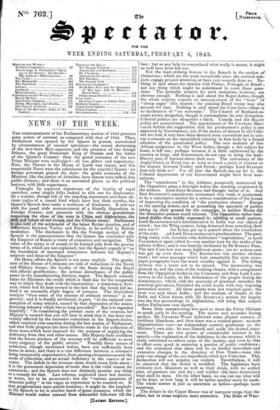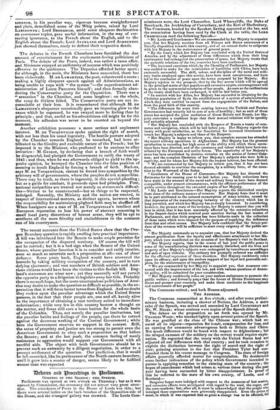NEWS OF THE WEEK.
THE commencement of the Parliamentary session of 1843 presents some points of contrast as compared with that of 1842. Then, Parliament was opened by the Queen in person, surrounded by circumstances of unusual splendour—the recent christening of the new-born Heir-apparent, and the presence of two foreign Princes, the great Protestant King of Prussia and the father of the Queen's Consort : then the grand measures of the new Prime Minister were undivulged : all was glitter and expectancy. Now, the Throne in the House of Lords was vacant, and five respectable Peers were the substitutes for the youthful Queen : no foreign potentate graced the show : the grand measures of the Minister, like the justice of Aristides, have almost been talked into public distaste ; and there is an unwonted gloom on the political horizon, with little expectancy.
Untaught by repeated experience of the inanity of royal speeches, some simple folks looked to this one for disclosures: for a wonder, though full of the standing statements and those ob- vious topics of a casual kind which have lost their novelty, the Queen's Speech does make a modicum of disclosure. It sets out with the usual stale announcement of a friendly disposition in Foreign Powers ; and proceeds with the obvious gratulations respecting the close of the wars in China and Afghanistan, the skill and valour of our troops, and the Chinese treaty. Parliament is also told of the settlement of the latest Syrian questian, and of differences between Turkey and Persia, to be settled by British mediation. The disclosure in this the Foreign section of the Speech is the announcement that the Queen has concluded with the Emperor of Russia a treaty of commerce and navigation. The value of the treaty is of course to be learned only from the precise terms of it, which are not explained ; but the Speech regards it "as the foundation of increased intercourse between her Majesty's subjects and those of the Emperor."
On Home affairs the Speech is not more explicit. The gentle- men of the House of Commons are told of reductions in the Naval and Military forces ; the loyalty of the Scots during the Royal visit affords gratification ; the serious disturbance of the public peace in the manufacturing districts, regret. The Speech scarcely takes for Ministers the credit which is their due for the temperate way in which they dealt with the insurrection ; a temperance, how- ever, which had its best reward in the fact that the revolt left be- hind it an unusually slight degree of soreness. The diminished receipts "from some of the sources of ordinary revenue" is re- gretted; and it is frankly attributed, in part, "to the reduced con- sumption of many articles, caused by that depression of the manu- facturing industry which has so long prevailed." But it is regarded hopefully : "In considering the present state of the revenue, her Majesty is assured that you will bear in mind that it has been ma- terially affected by the extensive reductions in the Import-duties, which received your sanction during the last session of Parliament, and that little progress has been hitherto made in the collection of those taxes which were imposed for the purpose of supplying the deficiency from that and other causes. Her Majesty feels confident that the future produce of the revenue will be sufficient to meet every exigency of the public service." Possibly these causes of reduction, though mentioned before, have not sufficiently been borne in mind; and there is a vast difference between a revenue's being temporarily unproductive, from passing circumstances and the mode of collection, and an actual deficiency in the sources of re- yenue. The deficit in the revenue alone would cause little alarm : it is the permanent depression of trade that is the valid reason for Uneasiness; and the Speech does not distinctly promise any thing as a remedy for that. Law reforms, neglected since last session, or worse, are to be prosecuted ; but the "various questions of domestic policy" is too vague an expression to be counted on. It play prognosticate mere parish-business ; it might be the loophole in the Speech to let in another batch of great measures, which the Minister would rather conceal from distrustful followers till the last ; but as any help to comprehend what really is meant, it might as well have been left out.
Not the least striking feature in the Speech is the section of Omissions ; which are the more remarkable since the omitted sub- jects engage present attention, or have very recently done so. No- thing is said about the treaties with France, Portugal, or Brazil ; nor any thing which might be understood to cover those ques- tions. The probable reasons for such omissions, however, are obvious enough. Nothing is said about the Sugar-duties, though the whole country expects an announcement of the "boon" of "cheap sugar" this session : the pending Brazil treaty may also account for that. Nothing is said about the Corn-laws—there is no declaration of "no surrender." The Church of Scotland es- capes notice altogether, though it contemplates its own disruption. Colonial politics are altogether a blank. Canada and the BAGoir policy are unmentioned. The appointment of Sir CHARLES MET. CALFE forbids the supposition that his predecessor's policy is not approved by Government; yet, if the stories of dissent in the Cabi- net are true, it may have been deemed most convenient not to con- vey a censure on the vanquished minority in that body by a formal adoption of the questioned policy. The new measure of free African emigration to the West Indies, though a fair subject for boast, is left out ; perhaps because it is little understood by the country at large' and Government do not care to bring the Anti- Slavery nest of hornets about their ears. The contumacy of the Anglo-Dutch at Natal was at least as much a point of interest as the dispute between Turkey and Persia : perhaps Lord STANLEY does not think so ? For all that the Speech can say for it, the Colonial department of our Government might have been non- existent.
The "amendment" to the Address, pompously announced by the Opposition press a fortnight before the meeting, evaporated in the menace. Lord JOHN RUSSELL had thought better of it. And Earl STAsurore's amendment, announced this week, is postponed, to be a substantive motion for a serious consideration of the means of improving the condition of "the productive classes." Except as the opening debate, and as presenting the spectacle of parties taking up their ground for the campaign, in neither House did the discussion possess much interest. The Opposition rather hesi- tated dislike than boldly expressed it ; nibbling at small matters. Lord ELLENBOROUGH'S administration in India was one object of attack ; but the Whig censors, being debarred from attacking their own war h.. the Indus, got up a quarrel about the misconduct of the sold. Aid Lord ELLENBOROUGH'S proclamations. The paci- fying treaty with America—the Ashburton "capitulation," as Lord PALMERSTON again called it—was another butt for the shafts of the solemn triflers ; and it was heartily vindicated by Sir ROBERT PEEL. The new Corn-law was more legitimate game ; yet no serious case was got up even there. The Income-tax was another obvious mark ; but some passages which look remarkably like stale news- paper paragraphs were the worst missiles against it. The failing revenue was a taunt not to be missed. The insurrection was glanced at, and the state of the working-classes, with a compliment from the Opposition leader in the Commons, and from Lord LANS- DOWNE ill the Lords, to the forbearance of the people during the disturbances; which, with the necessity of practical remedies for practical grievances, furnished the noble Lords with very imposing peroration matter. All these points were but touched upon : the most was said about India' and the motions of thanks to the India and China forces, with Mr. ROEBUCK'S motion for inquiry into the late proceedings in Afghanistan, will bring that subject before Parliament very shortly. Some little manceuvering was used to force the Prime Minister to speak early in the evening. The mover and seconder having spoken, Mr. CHARLES WOOD delivered some diluted censure, of
insidious blandness, and then there was a marked pause : no more Oppositionists rose—no independent country gentleman on the Minister's own side : he rose himself, and made the desired state- ment. There are two points of considerable interest in his speech,—the explanation of the deficiency in the revenue, which is really calculated to relieve some of the anxiety, and even by that
to effect some good in restoring a portion of public confluence; and the statement that there will be no further immediate and extensive changes in the direction of Free Trade—none this year—no change of the yet imperfectly-tried new Corn-law. This
declaration will not surprise our readers. Nevertheless, it will be observed that the denial is modified. The legislators have evidently met, Ministers as well as their rivals, with no settled plan, no panacea cut and dry ; and neither side have determined what shall be done. On the other hand, no one can say what will not be done, or how long it will be before another move be made. The whole matter is just as uncertain as before—perhaps more uncertain.
The debate in the Upper House was of narrower range than the other, but in some respects more attractive. The Duke of War.-
LINGTON, in his peculiar way, vigorous because straightforward and plain, demolished some of the Whig points, raised by Lord LAstsnowas ; Lord BROUGHAM, amid some eloquent declamation on commoner topics, gave useful information, in the way of cor- recting ignorance, to the French about the English, and to the English about the French; Lord AUCKLAND and Lord ASHBURTON just showed themselves, ready to defend their respective deeds.



























